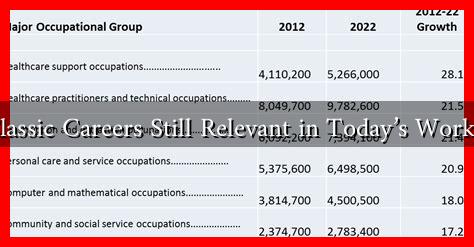-
Table of Contents
- Are Classic Careers Still Relevant in Today’s Workforce?
- The Enduring Value of Classic Careers
- Case Studies: Classic Careers in Action
- 1. Nursing: A Pillar of Healthcare
- 2. Teaching: Shaping Future Generations
- 3. Engineering: Innovating for the Future
- The Impact of Technology on Classic Careers
- Statistics Highlighting the Relevance of Classic Careers
- Conclusion: The Future of Classic Careers
Are Classic Careers Still Relevant in Today’s Workforce?
In an era dominated by rapid technological advancements and shifting economic landscapes, the relevance of classic careers—those traditional professions that have stood the test of time—has come into question. As we navigate through the complexities of the modern workforce, it is essential to evaluate whether these careers still hold value or if they are becoming obsolete in favor of emerging fields.
The Enduring Value of Classic Careers
Classic careers, such as teaching, nursing, engineering, and law, have been foundational to society for generations. Despite the rise of technology and automation, these professions continue to play a crucial role in our daily lives. Here are some reasons why classic careers remain relevant:
- Human Interaction: Many classic careers require a level of human interaction that technology cannot replicate. For instance, teachers and healthcare professionals provide emotional support and understanding that machines cannot offer.
- Complex Problem Solving: Professions like engineering and law involve complex problem-solving skills that require critical thinking and creativity—traits that are inherently human.
- Ethical Considerations: Fields such as law and medicine are deeply rooted in ethical considerations, necessitating human judgment and empathy that cannot be automated.
Case Studies: Classic Careers in Action
To illustrate the ongoing relevance of classic careers, let’s examine a few case studies:
1. Nursing: A Pillar of Healthcare
The nursing profession has evolved significantly over the years, yet its core mission remains unchanged: to provide care and support to patients. According to the U.S. Bureau of Labor Statistics, employment for registered nurses is projected to grow by 9% from 2020 to 2030, faster than the average for all occupations. This growth is driven by an aging population and an increased emphasis on healthcare services.
2. Teaching: Shaping Future Generations
Despite the rise of online education platforms, traditional teaching remains vital. A study by the National Center for Education Statistics found that students who receive in-person instruction perform better academically than those who learn online. Teachers not only impart knowledge but also foster social skills and emotional intelligence, which are crucial for personal development.
3. Engineering: Innovating for the Future
Engineering continues to be a cornerstone of innovation. The World Economic Forum reports that the demand for engineers is expected to grow as industries seek to develop sustainable technologies. Classic engineering disciplines, such as civil and mechanical engineering, are essential for infrastructure development and technological advancement.
The Impact of Technology on Classic Careers
While classic careers remain relevant, technology has undeniably transformed how these professions operate. Here are some ways technology is influencing classic careers:
- Automation: Routine tasks in fields like accounting and law are increasingly being automated, allowing professionals to focus on more complex aspects of their work.
- Telehealth: In nursing, telehealth has expanded access to care, enabling nurses to reach patients remotely while still providing essential services.
- Online Learning: In education, online platforms complement traditional teaching methods, offering flexibility and accessibility to students.
Statistics Highlighting the Relevance of Classic Careers
Several statistics underscore the ongoing importance of classic careers:
- According to a report by the World Economic Forum, 85 million jobs may be displaced by 2025, but 97 million new roles may emerge, many of which will require skills found in classic careers.
- The U.S. Bureau of Labor Statistics projects that healthcare occupations will add about 2.6 million new jobs by 2030, highlighting the demand for nursing and other healthcare professionals.
- In education, the National Education Association reports that teacher shortages are prevalent across the U.S., indicating a sustained need for qualified educators.
Conclusion: The Future of Classic Careers
In conclusion, classic careers are not only still relevant but are also evolving to meet the demands of a changing workforce. While technology continues to reshape how these professions operate, the fundamental human elements—empathy, critical thinking, and ethical judgment—remain irreplaceable. As we look to the future, it is clear that classic careers will continue to play a vital role in society, adapting and thriving alongside new innovations.
For more insights on career trends and workforce developments, you can visit the U.S. Bureau of Labor Statistics.


